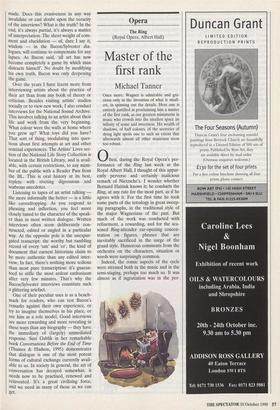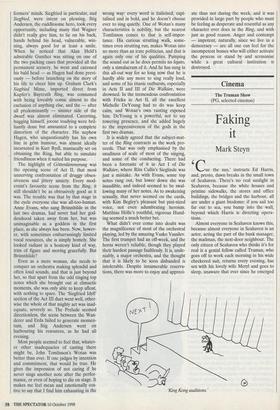Opera
The Ring (Royal Opera, Albert Hall)
Master of the first rank
Michael Tanner
Once more: Wagner is admirable and gra- cious only in the invention of what is small- est, in spinning out the details. Here one is entirely justified in proclaiming him a master of the first rank, as our greatest miniaturist in music who crowds into the smallest space an infinity of sense and sweetness. His wealth of shadows, of half colours, of the secrecies of dying light spoils one to such an extent that afterwards almost all other musicians seem too robust.
0 ften, during the Royal Opera's per- formance of the Ring last week at the Royal Albert Hall, I thought of this appar- ently perverse and certainly malicious remark of Nietzsche's. I wonder whether Bernard Haitink knows it; he conducts the Ring, at any rate for the most part, as if he agrees with it. For the first time he took some parts of the tetralogy in great sweep- ing paragraphs, in the traditional style of the major Wagnerians of the past. But much of the work was conducted with refinement, a rewarding, and for the sea- soned Ring-attender ear-opening concen- tration on figures, phrases that are inevitably sacrificed in the surge of the grand style. Humorous comments from the orchestra on the characters, situation or words were surprisingly common.
Indeed, the comic aspects of the cycle were stressed both in the music and in the semi-staging, perhaps too much so. It was almost as if ingratiation was in the per- formers' minds. Siegfried in particular, and Siegfried, were intent on pleasing. Stig Andersen, the cuddlesome hero, took every opportunity, including many that Wagner didn't really give him, to lie on his back, hands behind his head, vulnerable, win- ning, always good for at least a smile. When he noticed that Alan Held's admirable Gunther was sitting on one of the two packing cases that provided all the permanent scenery, he went and caressed his bald head — as Hagen had done previ- ously — before launching on the story of his life to cheer him up. Graham Clark's Siegfried Mime, imported direct from Kupfer's Bayreuth Ring, was consumed with being loveably comic almost to the exclusion of anything else, and the — after all predominantly — sinister side of the dwarf was almost eliminated. Cavorting, hugging himself, jocose toadying were bril- liantly done but amounted to a complete distortion of the character. His nephew Hagen, who unquestionably has his own line in grim humour, was almost ideally incarnated in Kurt Rydl, maniacally set on obtaining the Ring, but able to simulate friendliness when it suited his purpose.
The highlight of Gotterdammerung was the opening scene of Act II, that most unnerving confrontation of druggy obses- siveness and jittery anxiety. Every mod- ernist's favourite scene from the Ring, it still shouldn't be as obtrusively good as it was. The trouble was that by that stage in the cycle everyone else was all-too-human. Anne Evans, who sang Briinnhilde in the last two dramas, had never had her god- desshood taken away from her, but was unimaginable as a goddess in the first place, as she always has been. Now, howev- er, with sometimes embarrassingly limited vocal resources, she is simply homely. She looked radiant in a hostessy kind of way, trim of figure and moving gracefully. But Brannhilde?
Even as a mere woman, she needs to conquer an orchestra making splendid and often loud sounds, and that is just beyond her, so that apart from the odd ringing top notes which she brought out at climactic moments, she was only able to keep afloat, with nothing to spare. The 'Siegfried Idyll' section of the Act III duet went well, other- wise the whole of that mighty act was inad- equate, severely so. The Prelude seemed directionless, the scene between the Wan- derer and Erda failed to generate momen- tum, and Stig Andersen went on harbouring his resources, as he had all evening.
Most people seemed to feel that, whatev- er other inadequacies of casting there might be, John Tomlinson's Wotan was better than ever. If one judges by intention and commitment, that would be true. He gives the impression of not caring if he never sings another note after the perfor- mance, or even of hoping to die on stage. It makes me feel mean and emotionally cos- tive to say that I find him exhausting in the wrong way: every word is italicised, capi- talised and in bold, and he doesn't choose ever to sing quietly. One of Wotan's many characteristics is nobility, but the nearest Tomlinson comes to that is self-impor- tance. His curious strutting walk, some- times even strutting run, makes Wotan into no more than an irate politician, and that is again only one of his qualities. Pumping the sound out as he does permits no legato, only a simulacrum of it. And he has sung in this all-out way for so long now that he is hardly able any more to sing really loud, and some of his titanic outbursts, especially in Acts II and III of Die Walkiire, were drowned. In the tremendous confrontation with Fricka in Act II, all the excellent Michelle DeYoung had to do was keep calm, and Wotan's own ranting exposed him. DeYoung is a powerful, not to say towering presence, and she added hugely to the impressiveness of the gods in the first two dramas.
It is widely agreed that the subject-mat- ter of the Ring contracts as the work pro- ceeds. That was only emphasised by the smallness of scale of most of the singing, and some of the conducting. There had been a foretaste of it in Act I of Die Walkiire, where Rita Cullis's SiegJinde was just a mistake. As with Evans, some top notes rang out, but lower down she was inaudible, and indeed seemed to be swal- lowing many of her notes. As to awakening sexually, that never seemed on the cards, with Kim Begley's pleasant but pint-sized voice, not even adumbrating heroism. Matthias Mlle's youthful, vigorous Hund- ing seemed a much better bet.
What didn't ever come into doubt was the magnificence of most of the orchestral playing, led by the amazing Vasko Vassilev. The first trumpet had an off-week, and the horns weren't reliable, though they played their hardest passage faultlessly. It is, unde- niably, a major orchestra, and the thought that it is likely to be soon disbanded is intolerable. Despite innumerable reserva- tions, there was more to enjoy and appreci- ate than not during the week, and it was provided in large part by people who must be feeling as desperate and resentful as any character ever does in the Ring, and with just as good reason. Anger and contempt — impotent, naturally, since we live in a democracy — are all one can feel for the incompetent bosses who will either activate the process or stand by and sermonise while a great cultural institution is destroyed.











































































 Previous page
Previous page